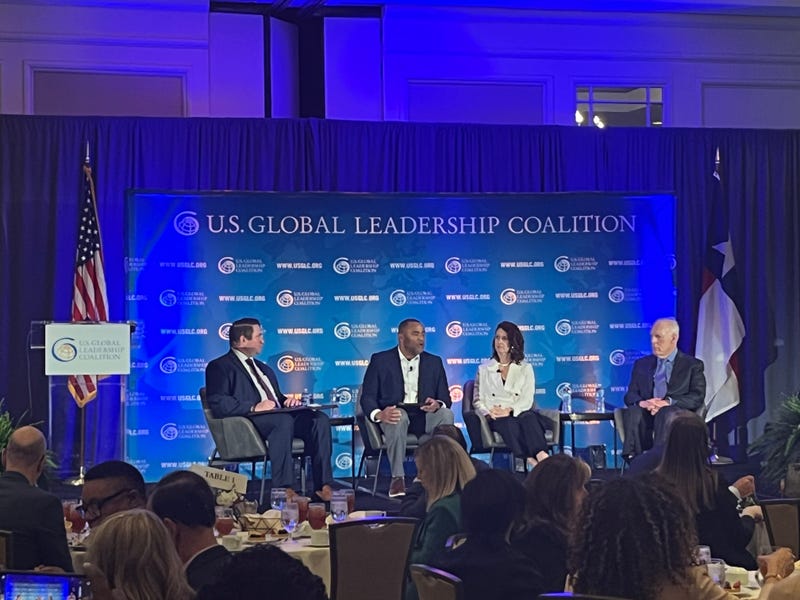
The U.S. Global Leadership Coalition met in Las Colinas Wednesday to talk about Texas' role in the global economy. The coalition includes business leaders, former Cabinet secretaries from both parties, and retired military leadership.
The group said foreign trade supports 3.6 million jobs in Texas and 20.1% of all jobs here. They said Texas exported $375.3 billion in goods to other countries in 2021. The state's biggest trading partners are Mexico, Canada, China, South Korea, and Brazil.
U.S. Rep. Marc Veasey (D-Fort Worth) attended a roundtable with retired Army Lt. Gen. Stephen Speakes and Texas International Education Consortium Chief Executive Robin Lerner. They said less than 1% of the federal budget is spent on international affairs, but 11 of the United States' 15 biggest trading partners once received aid from the U.S.
They said every dollar spent trying to prevent conflict saves $16 on later defense spending and that aid to places like Ukraine and Israel can help them build their economies and prevent additional spending long-term.
"It's the cheapest, most effective, and most humanitarian way to try to restore stability in struggling economies," Speakes said.
Speakes cited economic growth in the former Yugoslavia as an example. He said recovery there has outpaced spots like Iraq and Afghanistan. Speakes said the United States typically gets involved when people have been disconnected from their way of life and need help.
"Typically, when American forces enter, the state is not good," he said. "There were serious needs for help before the campaign, but it's exacerbated by the occupation."
"Afghanistan right now is a failed state," Lerner said. "It is a non-entity for a lot of us."
Lerner said "Democracies tend not to go to war with democracies," and countries with the greatest gender discrimination are the least stable and least democratic.
"Those two things are so intertwined," she said. "It really matters to all of us to work for a society that looks a little like us. Let's be a little prideful and say, 'We are a democracy. We are imperfect. We've got to work at it all the time. We cannot rest on our laurels.' That's why development and diplomacy matter."
"I love the observation that democracies don't fight democracies," Speakes said. "It seems to me if we look at the nations presenting a threat to our way of life. They're generally autocracies, they do not have advanced middle classes, they don't have distribution of wealth. From our standpoint, everything we can do as a nation to be an advocate for the building of modern economic ties, trade, and commerce, we are advancing our security and stability."
Speakes said his time in the Army showed the importance of planning a defense budget that goes beyond weapons and manpower.
"If we were doing advancement for our way of life, I think we're doing great things to enhance our stability," he said.
They said trying to build the economies of fragile nations and providing humanitarian relief can prevent conflict.
"Diplomacy tools mobilized by the Department of State are the cheapest, most effective, and most humanitarian way to try to restore stability in struggling economies," Speakes said, adding military force alone does not have the capability of restoring stability.
Lerner said the State Department's International Visitor Leadership Program also contributes to economic growth. The program provides short-term visits for professionals in other countries to make contacts here. She said each dollar spent on the program has an $8 return.
"Those people are coming and spending money, they're taxed, all these things are happening in our communities," she said. "Then you're making a contact, free to you, who might become an export partner, help you start a program in another country, get a grant in another country. That's a huge benefit to those of us who just don't have those connections."
Veasey said NATO has helped maintain peace in the United States and Europe. He said Russia's invasion of Ukraine has "reinvigorated" the organization.
Veasey said international relationships will help the economies of Texas and the rest of the United States grow. He said America is starting to increase production of semiconductors, but now, we need access to Taiwan's production.
Veasey said China also produces a lot of components used in electric vehicles built in the United States.
"We want to make sure America is making those electric vehicles because, I can tell you, more and more countries in Europe want them," he said. "If we don't figure out a way to get along with China as they become stronger and more adversarial, it will slow us down and perhaps allow them to dominate in those European countries instead of us."
He said members of both parties have a responsibility to help people avoid "looking inward."
"I can tell you, we cannot grow our economy that way. We cannot be safe that way," Veasey said. "That is just not how the world works these days. It's not feasible. It's not realistic."
LISTEN on the Audacy App
Tell your Smart Speaker to "PLAY 1080 KRLD"
Sign Up to receive our KRLD Insider Newsletter for more news
Follow us on Facebook | Twitter | Instagram | YouTube
